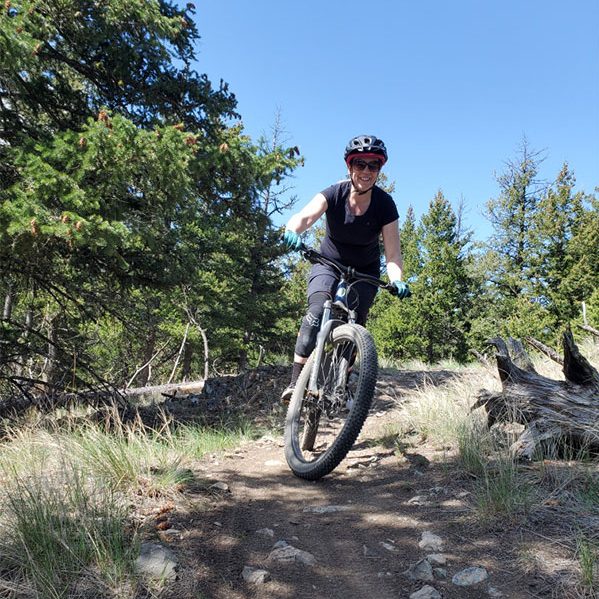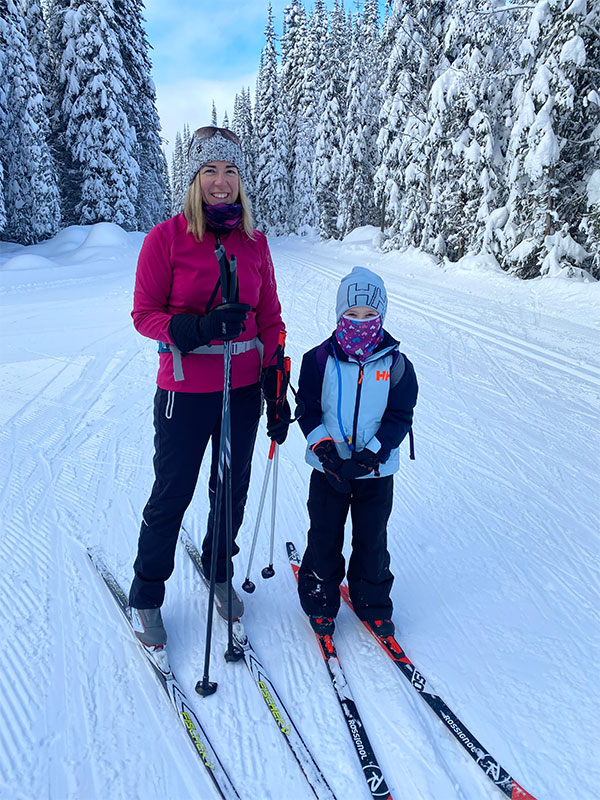WHEN FACULTY OF MANAGEMENT ASSISTANT PROFESSOR Dr. Jennifer Davis was five, she imagined splitting her time between hairdressing and surgery. She smiles at the memory; “The plan was my brother would drop me off at work in his dump truck.”
As her ambitions evolved, she discovered her talents as a pianist and violinist, and considered the possibility of playing trombone professionally in a jazz band. But it wasn’t until high school when Dr. Davis discovered her zeal for the sciences, and by the time she was in university, a vision of what she really wanted to do started to materialize.
“During my fourth year in honours physiology I got my first taste of bench versus bedside research,” Dr. Davis says. “I was intrigued because it gave me the opportunity to be creative and to think of questions that would be interesting to answer. I decided to take a year and work as a research assistant at a clinical lab, where I looked at osteoporosis prevention, bone health and falls prevention. It soon became clear to me that I wanted to conduct applied clinical research.”
This trajectory ultimately led Dr. Davis to a master’s degree in experimental medicine and a PhD focused on applied health economics. “I really enjoyed the opportunity to work with multidisciplinary teams of researchers, clinicians and policymakers. It felt like the right fit for me.”
Asking the important questions
Dr. Davis is now an applied health economist. She readily admits that understanding what her role entails may not necessarily be intuitive. “A lot of my work involves doing economic evaluations alongside clinical trials that look to combat dementia and mobility impairments in older adults. My role as a clinically applied health economist is to come up with an assessment of the value for money of different intervention and prevention efforts.”

Dr. Jennifer Davis enjoys mountain biking in the Okanagan.
While the term health economist often elicits thoughts of the dollars involved, Dr. Davis reveals that although considering costs and cost burden is an important part of economic evaluation, the key is simultaneously considering actual health outcomes. For her, the exciting part of health economics is not only the collaboration between clinicians and clinical researchers, but also asking questions that are important to patients. “The ultimate goal is to generate high-quality evidence that we can use to inform best practice and health policy decision making.”
When it comes to her research, Dr. Davis’s elderly subjects are more than mere participants. “We invite them to be formal members of our research team,” she says. “They’re patient partners that contribute to all aspects of the research process.”
Dr. Davis expresses gratitude and praises these members of the team for being thoughtful, engaged and providing valuable insights. “With our research lens, we haven’t necessarily had the perspective of individuals who have lived experience with receiving care for a fall.” She goes on to say that adding this perspective has been beneficial from the research design phase through to interpreting their findings. “Our patient partners have told us they feel positive about having the opportunity to give back and pay it forward. They also enjoy the social aspect of being part of the research team.”
This work fulfills Dr. Davis’s passion for working with older adults. Like many, she’s personally seen the devastating consequences for people who have fallen and sustained injury, often contributing to a negative quality of life. “The good news is we know how to prevent falls. The next step is to determine how to prevent falls while saving the health-care system dollars.”
In January 2022, Dr. Davis joined a distinguished group of scholars and scientists as she was appointed a
Tier 2 Canada Research Chair for Applied Health Economics. Through her research program she will address issues of mobility impairment, chronic conditions and cognitive function that have historically drained the health-care system.
“The overarching goal of my research program is to focus on how we can efficiently add quality life years to older Canadians by developing innovative applied health economics research methods,” Dr. Davis says. “The outcomes have strong potential for the health-care system and health-care policy impact.”
It’s all about the people
Based on the needs of the region and the campus to build capacity in the area of health management, Dr. Davis was welcomed by the
Faculty of Management. Her unique hybrid research program demonstrates the breadth of the management subject area, which made her a perfect fit.

Dr. Jennifer Davis exploring the Okanagan in wintertime.
When considering the opportunity to pursue her research at UBC Okanagan, Dr. Davis says that like many of her decisions, it came down to the people. “There’s such a diverse group of fantastic, talented people at UBCO. For me, it felt like a great opportunity. There are a lot of really interesting research initiatives and cross collaborations between Faculties, which is a wonderful environment to be in.”
Dr. Davis adds that she cherishes the Okanagan’s four distinct seasons. “Coming from the lower mainland, I think the first thing I really appreciated about the Okanagan was all the things there are to do because there are more seasons. Since coming here, I’ve learned how to ski and mountain bike. It’s been really fun enjoying some of these extra seasonal activities.”
One can’t help but raise an eyebrow when a researcher with falls prevention experience mentions enjoying learning to ski and mountain bike. Dr. Davis laughs, “That’s true, but I’m fairly risk-averse so I’m very cautious. I won’t be the fastest person down the hill, that’s for sure.”


